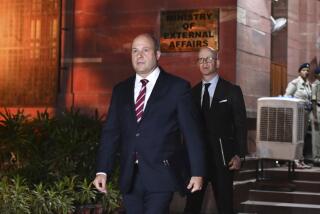Bum’s Rush Diplomacy
- Share via
For years the Soviet Union has been allowed to maintain a much larger embassy in Washington than the United States operates in Moscow. The Soviet consulate in San Francisco also is larger than the American consulate in Leningrad. There is nothing wrong with moving to equalize the numbers on each side, but the timing and the manner of Tuesday’s expulsion order against 55 Soviet diplomats are almost guaranteed to do more harm than good.
The State Department said that five of the Soviet diplomats--four from the Washington embassy and the other from the San Francisco consulate--are being expelled in direct retaliation for the Soviet expulsion of five U.S. diplomats from the Soviet Union last weekend.
The Russian action, in turn, was in retaliation for the American expulsion of 25 Soviet diplomats from the United Nations on grounds that they had engaged in espionage.
The expulsion of the other 50 Soviet diplomats, who also must leave the country by Nov. 1, was explained as a move to bring the number of Soviet diplomats in Washington and San Francisco down to the level of U.S. diplomats in the Soviet Union--something Congress mandated, but gave the Administration three years to achieve.
The Administration’s basic aim has been to make the Soviets understand that the United States will not tolerate the use of the United Nations as a safe-house for large-scale espionage. The Soviets were warned in advance that retaliation against U.S. diplomats in the Soviet Union would be unwarranted, and would meet with a further U.S. response. Tuesday’s expulsion order showed that Washington meant it.
Surely, however, President Reagan understands that he may pay a high price for his sledgehammer tactic. The Soviets may now feel honor-bound to retaliate still again. If so, what will be the American response then? Where does it end? An atmosphere of tension and injured pride on both sides could make it difficult to carry on serious negotiations on arms control or anything else.
All this was unnecessary. The Administration could have treated the Soviet expulsion of five U.S. diplomats in response to our expulsion of 25 Soviets from the United Nations as a pretty good swap. As for the expulsion of the other 50 Soviets, the Administration could have, and should have, held off on meeting the congressional mandate until a time when the question of balancing the two countries’ diplomatic missions could be treated as the separate issue that it really is.
By acting in a ham-handed way, the Administration has made it easy for the rest of the world to blame the United States for any breakdown in negotiations that now occurs.
More to Read
Get the L.A. Times Politics newsletter
Deeply reported insights into legislation, politics and policy from Sacramento, Washington and beyond. In your inbox twice per week.
You may occasionally receive promotional content from the Los Angeles Times.










